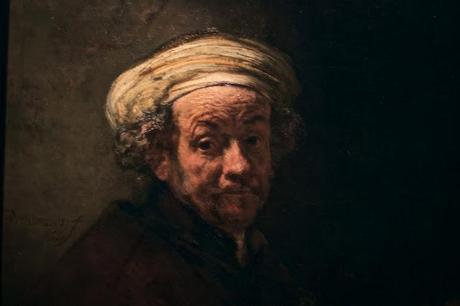 location: Amsterdam, Netherlandsphotograph: Costanza Saglio
location: Amsterdam, Netherlandsphotograph: Costanza Saglioperiod: march 2012
- Rembrandt - selfportrait at Rijksmuseum -Ad Amsterdam, non distante dalla bellissima Waterloopeiln, ad un suggestivo incrocio a ridosso di un canale, vi è la favolosa casa in cui visse e operò Rembrandt (CLICCATE QUI per vedere la mappa) ora adibita a museo dedicato all'artista.Non solo arredamento, storia e pittura: il sapiente allestimento del museo, permette una visita interattiva, coinvolgente e sorprendente.
Volete sapere di cosa si tratta? continuate a leggere l'articolo, cliccando su read more.
In Amsterdam, not far from the beautiful Waterloopeiln, at a fascinating intersection near a canal, there is the fabulous house where Rembrandt lived and worked (CLICK HERE to see map), now a museum dedicated to the artist.
Not only furniture, history and art: the wise arrangement of the museum, allows an interactive tour, engaging and surprising.
Want to know what this is? keep on reading this article, click on read more.
La casa di Rembrandt è un sogno, costruita su più piani intorno ad una scala a chiocciola di legno. Siccome Rembrandt cadde in rovina, quello che vediamo oggi della mobilia è una ricostruzione in base ai suoi disegni e alle sue descrizioni. L'effetto è comunque molto bello e non particolarmente artefatto.
Il quantitativo di dipinti presenti è poco più che misero - ci sono molte più stampe. E a questo proposito, la vera ricchezza del museo: i laboratori.
Rembrandt's house is a dream, built on several floors around a spiral staircase made of wood. Since Rembrandt fell into ruin, what we can see today is a reconstruction of the furniture according to his drawings and his descriptions. The effect is still beautiful and it doesn't look so artificial.
The amount of paintings is very low - there are many more prints. In this regard, the real wealth of the museum are: the laboratories.
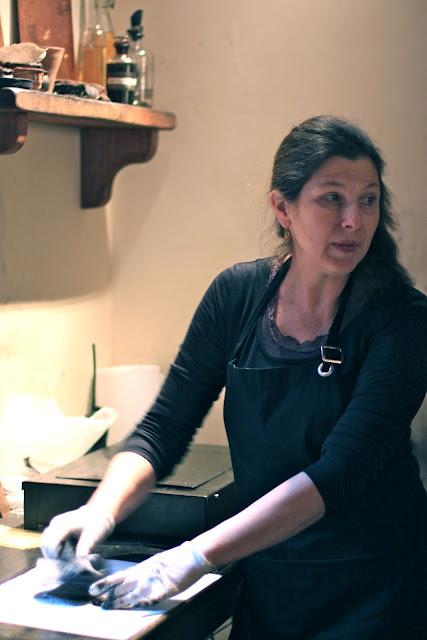
location: Amsterdam, Netherlandsphotograph: Costanza Saglio
period: march 2012
Un signora, in un inglese che a me è risultato di una comprensibilità incredibile, ci ha invitati in una stanza in cui era presente una vecchia grossa pressa. Ha iniziato a spiegarci che Rembrandt alla sua epoca era più conosciuto per essere un fine stampatore, più che un pittore, in quanto le stampe circolavano di più sul mercato: per via del prezzo e della riproducibilità, erano più 'pop' dei quadri commissionati dalle ricche famiglie.A woman, speaking English in a way that was incredibly intelligible, invited us into a room where there was a big old press. She began to explain that at Rembrandt's times he was best known for being a fine printer, rather than a painter, because the prints circulated more on the market: because of the price and reproducibility, they were more 'pop' than paintings commissioned by rich families.
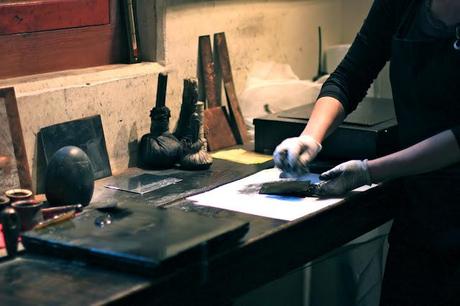
photograph: Costanza Saglio
period: march 2012
Dopo un primo excursus storico, inizia la dimostrazione: spiegando ogni passaggio nel dettaglio, ci hastregato mostrandoci come dall'incisione sulla lamella di rame, si giunge alla stampa su carta.
After an initial historical overview, she starts the demonstration: explaining each step in detail, the lady was showing us how to spell the incision on the plate of copper, and how it comes to printing on paper.
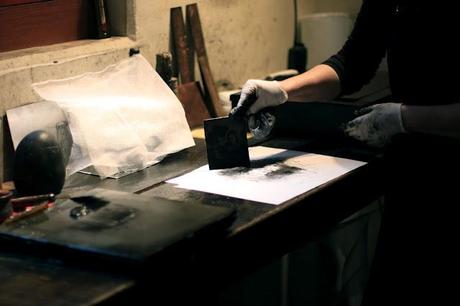
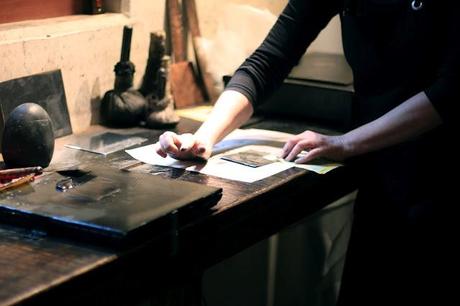
period: march 2012
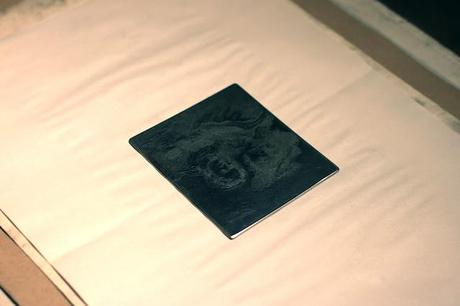
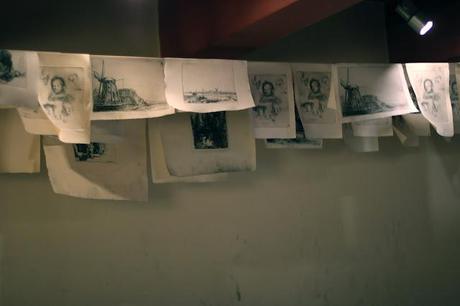
period: march 2012
Interessantissimo è stato anche scoprire come Rembrandt fosse uno sperimentatore, anche su questo campo. E' stato lui, infatti, ad introdurre la tecnica di incisione fruttando la corrosione chimica - sostituendo così l'incisione manuale. Ciò permise un'incredibile miglioramento: disegnare sulla lamella di rame divenne più semplice e immediato, permettendo linee molto più sottili e simili al disegno.Per ottenere nella stessa immagine effetti differenti, Rembrandt utilizzava le varie tecniche conosciute, tutte insieme, realizzando opere incredibili.
Tra l'altro, a differenza dei più, Rembrandt non faceva copiare ad artigiani i propri quadri, bensì studiava soggetti inediti realizzati di suo pugno, rendendo ogni stampa detentrice di un valore artistico incredibile.
It was also interesting to find out how Rembrandt was an experimenter on this field. It's him, in fact, that introduced engraving technique by exploiting the chemical corrosion - thus replacing the manual engraving. This allowed an incredible improvement: drawing on the blade of copper became more simple and straightforward, allowing much finer lines and sketch-like.
To achieve different effects in the same image, Rembrandt used the various techniques known all along, creating incredible works.
Among other things, unlike most, Rembrandt was not copied to craft his own frameworks, but he studied new subjects that he realized by in his own hand, making each print holder of an incredible artistic value.
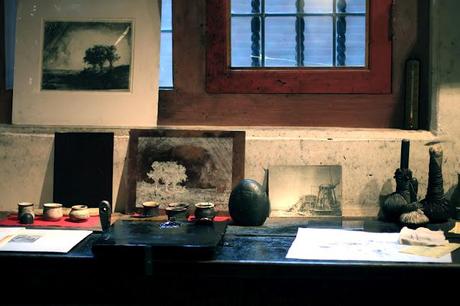
period: march 2012
Ora qualche foto della casa:Now, some pictures from the house:
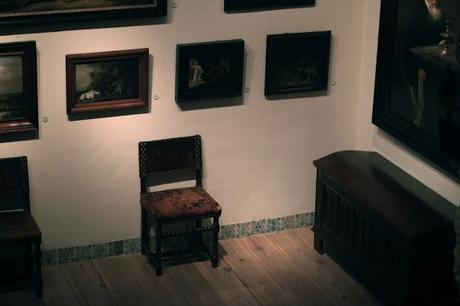
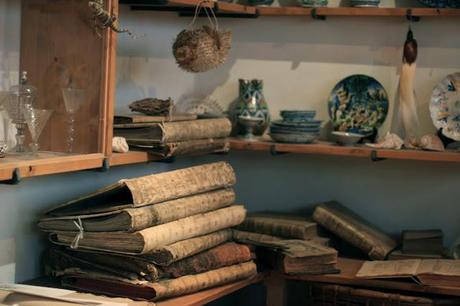
period: march 2012
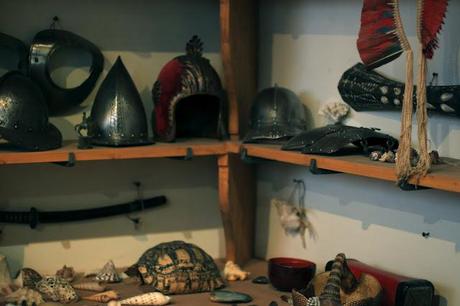
period: march 2012
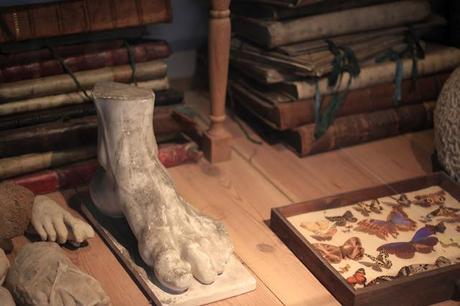
period: march 2012
Altra dimostrazione è quella relativa alla realizzazione dei colori a partire da polveri e pigmenti naturali.Another demonstration was that relating to the creation of colors from natural pigments and powders.
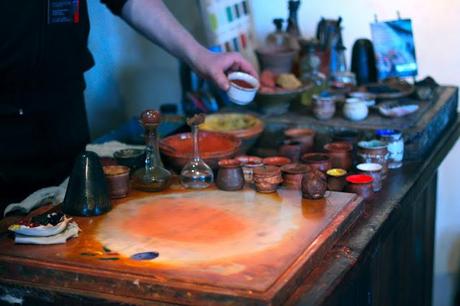
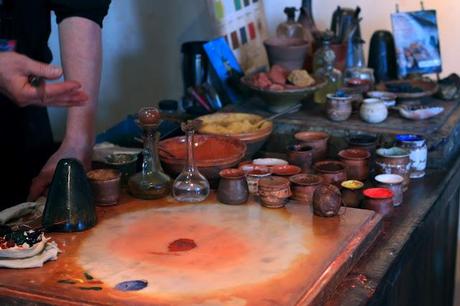
period: march 2012
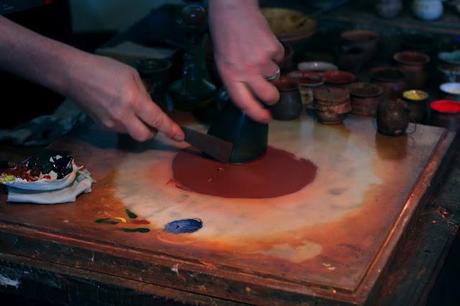
period: march 2012
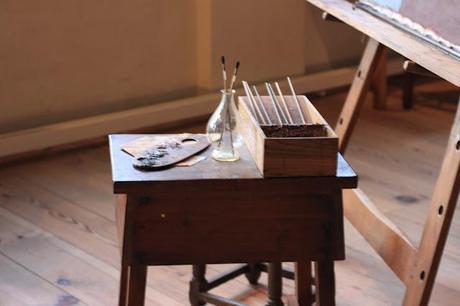
period: march 2012
Le sale a maggiore impatto artistico sono state, a mio parere, quelle relative alle stampe. Mi hanno affascinato soprattutto quelle riguardanti la commedia dell'arte.Alla tecnica della stampa, Rembrandt univa l'acquerello, la china acquerellata, l'inchiostro e altre tecniche. In questi lavori "più umili" è quasi più evidente il talento e il genio dell'artista. Una piacevole scoperta.
The best artistic impact's rooms, in my opinion, were those relating to the prints. I was fascinated especially those about the commedia dell'arte.
Rembrandt joint the technique of printing to watercolors, china, ink and other techniques. In this "more humble" works, it is almost more obvious the artist's talent and genius. A pleasant discovery.
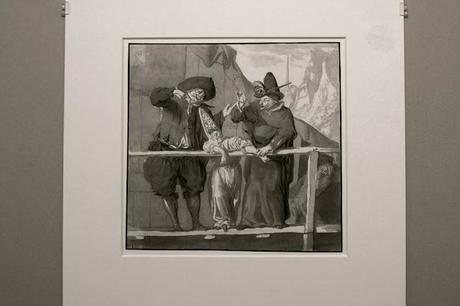
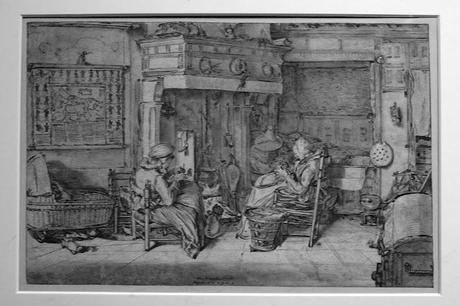
Some of you love knitting? The "women in my family" are great workers in this area, and they really liked this print ;).
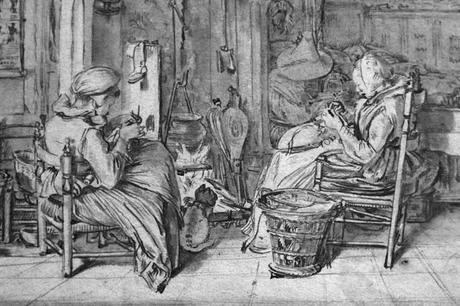
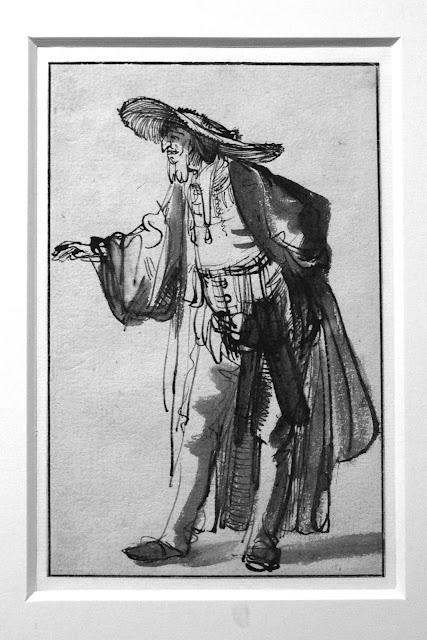
location: Amsterdam, Netherlandsphotograph: Costanza Saglioperiod: march 2012- Pantalone -
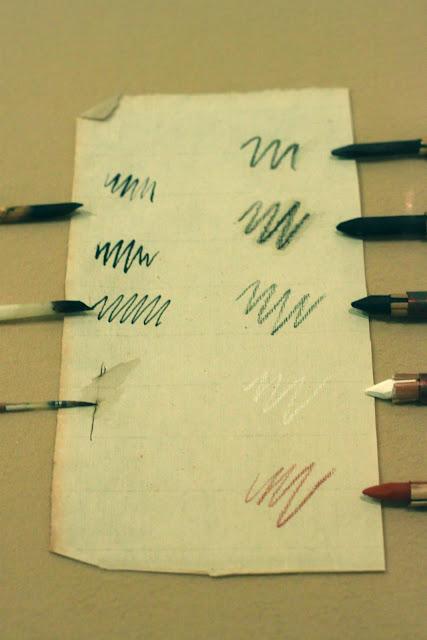
period: march 2012
Ora ci spostiamo verso i musei di mseumplein (CLICCATE QUI per la mappa). Qui ci sono il Rijksmuseum, il museo di Van Gogh (di cui vi parlo nel prossimo post per motivi di spazio) e il museo dei diamanti. Un consiglio per perdere ogni coda: o comprate i biglietti online o li comprate al museo dei diamanti. Lì, potrete comprare anche solo il biglietto per gli altri due musei (non dovete per forza visitare quello sui diamanti) e non c'è mai coda!!Prima tappa: i dipinti di Rembrandt, sono custoditi al Rijksmuseum. Grande museo, senza milioni di quadri strepitosi - non aspettatevi la sindrome di Stendhal - ma allestito come pochi altri ho visto. L'allestimento è curatissimo e perfetto. Io sono una pignola su queste cose, e bado spesso a come sono trattati i quadri nei musei, come sono disposti e valorizzati.
Beh moltissimi musei dovrebbero trarre ispirazione dal Rijsk. Pur non contenendo molte opere da svenimento, ogni quadro ha il suo peso, grazie alla sapiente illuminazione, collocazione, inclinazione.
Now we move to the museums of mseumplein (CLICK HERE for map). Here are the Rijksmuseum, the Van Gogh Museum (about which I'll speak in the next post for reasons of space) and the Diamond Museum. A tip to lose any line; or you buy your tickets online or you buy them at the Diamond Museum. There, you can also buy just the ticket for the other two museums (you are not obliged to visit diamond museum) and there is never the queue!
First stop: the paintings of Rembrandt, are kept at the Rijksmuseum. It's a big museum, without million outstanding works - do not expect the Stendhal syndrome - but it's set up like few others I have seen. The string up design is very accurate and perfect. I am a stickler about these things, and I really care about how paintings are treated in museums, as they are willing and valued.
Well many museums should draw inspiration from Rijsk. While it doesn't contain many breathtaking works, each painting has its weight, thanks to the skillful lighting, location, inclination.
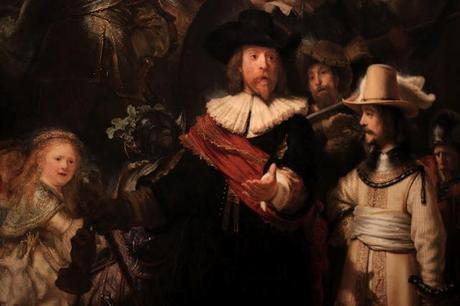
Ecco i due must della collezione:
Don't think, however, that with my words I wanted to play down the collection of the Rijksmuseum. There are still some works that are well worth the visit. I only say that it is not the Louvre or the Metropolitan, despite it is the largest museum in the city, which keeps the largest collection of Dutch painting.
Here are two must-see of the collection:
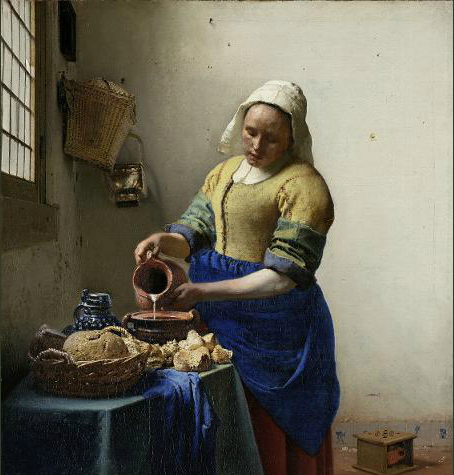
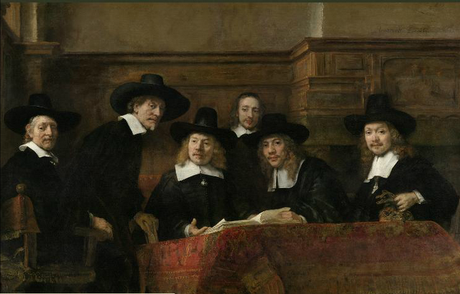
Vi lascio un video di presentazione:
Furthermore, from March 7 to May 7 (we were at the Rijks on March 7 just by chance), the exhibition Ottomania is open, dedicated to western prints about Ottoman Empire. Having attended the print-workshop the day before, we have been able to give more value to the works, the technical and the art level of their drawings.
I leave you a video presentation:
Voi siete mai stati? conoscevate le tecniche di stampa? Siete degli amanti di questo genere di arte? Conoscete bene Rembrandt o siete degli appassionati della cultura turca?Fatemi sapere le vostre impressioni in un commento!
La prossima tappa sarà: Van Gogh museum!
A presto, buon sabato, buon 151° anno d'unità di Italia, buon Saint Patrick Day e soprattutto un saluto di vicinanza a tutti gli amici di Libera che oggi partecipano al corteo di Genova in ricordo alle vittime di mafia. Quest'anno io non ho potuto partecipare, ma il mio pensiero va a loro!
C.
You've never been there? Did you know the printing techniques? Do you love this kind of art? Do you know well Rembrandt's works or do you love Turkish culture?
Let me know your impressions in a comment!
The next stage will be: Van Gogh museum!
See you soon, good Saturday, good 151th year of a united Italy, have a good Saint Patrick's Day and especially greetings of proximity to all the friends of Libera now participating in the parade in Genoa to commemorate the victims of the Mafia. This year I could not attend, but my thoughts are with them!
C.







